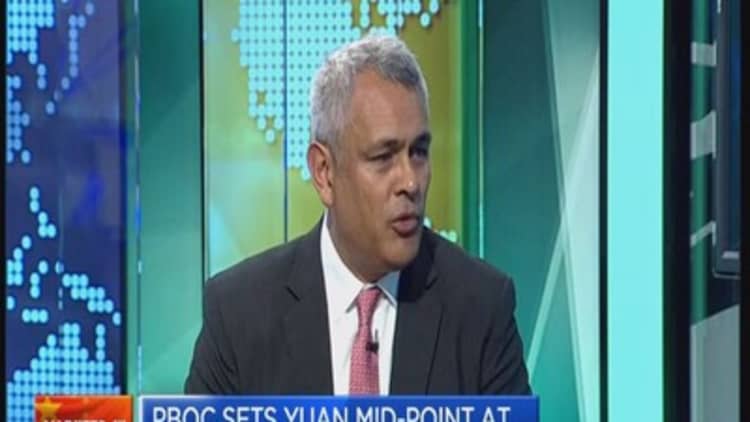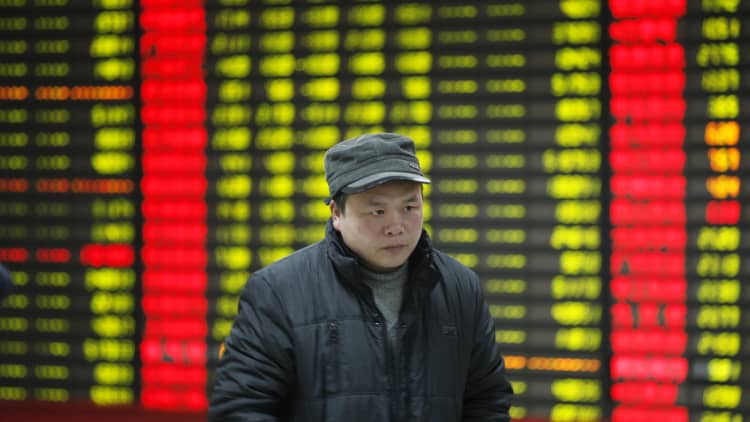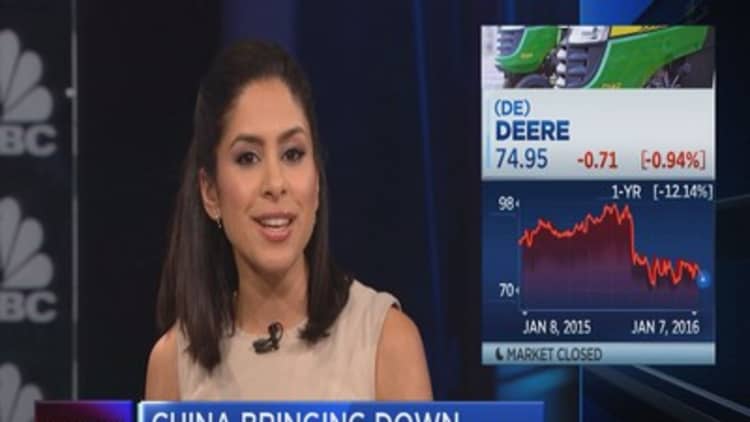


Asian markets closed mixed on the last day of 2016's first trading week, after a wild ride that saw the Chinese market shut down prematurely twice to stem rapid selloffs, oil prices falling to 12-year lows and the persistent volatility across the region.
On Friday, the closed up 1.98 percent after trading down as much as 1.89 percent and up as much as 3.32 percent shortly after the market open. The Shenzhen Composite finished 1 percent higher, while CSI 300 index ticked up 2.04 percent. All three indexes see-sawed wildly from positive to negative in the first 30 minutes after trade started. Hong Kong's Hang Seng Index closed 0.59 percent higher.
China's regulatory body, the China Securities Regulatory Commission (CSRC), on Thursday suspended the recently implemented circuit breakers, a regulatory tool designed to limit how far stocks can fall after the market shut down for a second time this week. The first shut down was triggered on Monday after the CSI300 index fell more than 7 percent.
Mizuho said on a Friday note that it had expected the market was due a reflexive rebound as stretched positions were reversed. But it added that Chinese markets are not yet out of the woods.
"The greater uncertainty is how this week's episode has damaged investor sentiment, and thus capital outflow pressures might linger on," Mizuho said.
The weakening of the yuan has also weighed on the market. Before trading began, the People's Bank of China (PBOC) set its yuan mid-point at 6.5636 against the dollar, indicating the Chinese currency would trade slightly stronger, after Thursday's fixing guided the yuan lower at its fastest pace since August's devaluation. On Thursday, the dollar was fetching 6.5926 yuan at the close of trade.
"Market volatility this week suggests that nobody really knows what the policy is right now. Or if the government itself knows or is capable of implementing the policy even if there is one," DBS said in a currency note Friday. "The market's message was loud and clear that more clarity and less flip-flopping is needed going forward."
Rest of Asia close mixed
Elsewhere, Australian markets initially tracked China gains, but quickly returned to negative territory, with the ASX 200 closing down 19.54 points, 0.39 percent, at 4,990.80. Australia saw its dollar fall below the closely watched $0.70 support in overnight trade, but the Aussie recovered to around $0.7055 in Asian hours. The dollar-yen pair recovered to trade at 118.31 after falling as low as 117.47.
Japan's was flat in late afternoon trade before slipping to close down 69.38 points, or 0.39 percent, at 17,697.96. Korea'sKospi added 13.29 points, 0.7 percent, to 1,917.62. In New Zealand, the main index closed down 0.89 percent.
Oil rallies in Asian trade
Also helping to support some of the gains around the region, oil prices rallied during Asian trade with the West Texas Intermediate (WTI) futures up 2.28 percent at $34.03 a barrel. The globally traded Brent was up 2.55 percent at $34.60 a barrel. Overnight, prices for both futures tumbled to 12-year lows.
Energy plays around the region traded mixed, however, In Australia, Woodside Petroleum, Oil Search and Santos closed up between 3.48 and 4.67 percent. Chinese oil plays were also in positive territory, with Hong Kong-listed CNOOC, PetroChina and Sinopec up between 1.06 and 5.56 percent.
But Japanese energy plays Inpex and Japan Petroleum closed lower. Reports said Japan's Economy Minister Akira Amari said the continued decline in oil prices, though not a good sign for the world economy, would improve Japan's terms of trade. The country's finance ministry said foreign reserves at the end of December ticked up to $1.23 trillion.
Gold slips down 0.9 percent
Gold miners appeared to continue to benefit from market turmoil, with an uptick in share prices. Newcrest tacked on 1.52 percent and Alacer Gold rose 6.34 percent by the market close. Gold, a safe-haven investment during times of economic uncertainty, hit a nine-week high, with climbing up to $1,107.80 an ounce overnight. But prices slipped in Asian trade by 0.9 percent to $1,099.45 an ounce.
Meanwhile, Japan's Fast Retailing saw its shares retrace some early losses to close down 2.33 percent after the company cut its full-year profit outlook to 180 billion yen ($1.5 billion) for the year through end-August. Reports said the company saw a 12 percent fall in December sales on year in its domestic Uniqlo outlets due to warm weather. Previous forecast estimated 200 billion yen in profit.
In South Korea, shares of heavyweight Samsung Electronics traded higher, rising 0.69 percent, despite the company missing expectations on its fourth quarter operating profit. The consumer electronics giant said its profit for the October-December quarter likely rose 15 percent on-year to 6.1 trillion won ($5.10 billion). A Reuters survey of analysts estimated that number would be at 6.6 trillion won.
In overnight trade

Major indexes in the U.S. shed over 2 percent each overnight. The was down 392.41 points, or 2.32 percent, at 16,514.10. The S&P 500 closed down 47.17 points, or 2.37 percent, at 1,943.09, while the saw losses of 146.34 points, or 3.03 percent, at 4,689.43.


